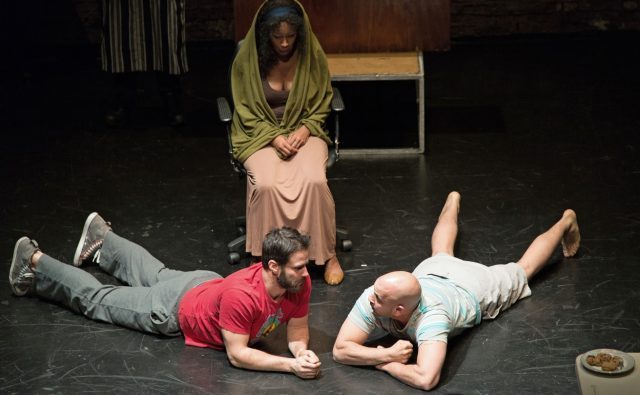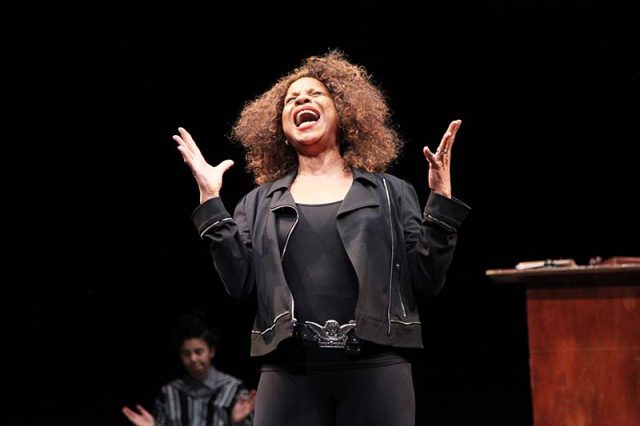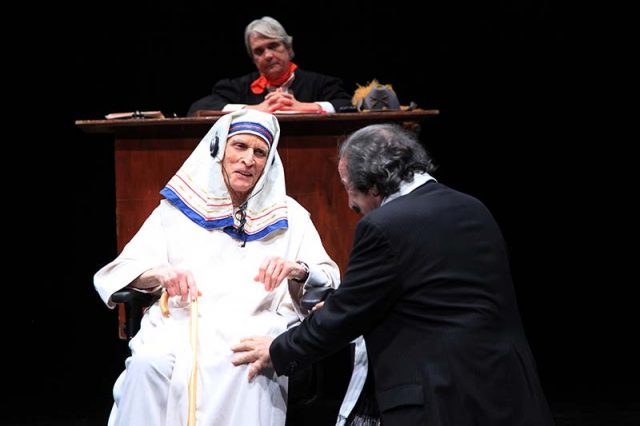
Henrietta Iscariot (JoAnna Rhinehart) watches her son, Judas (Gabriel Furman, left), play as a child in Stephen Adly Guirgis revival (photo by Shashwat Gupta)
Ellen Stewart Theatre, La MaMa
66 East Fourth St. between Bowery & Second Ave.
Thursday – Saturday through March 26
lamama.org
In 2015, New York City native Stephen Adly Guirgis won the Pulitzer Prize for his off-Broadway hit Between Riverside and Crazy. In January, he was named a Residency One Playwright at the Signature Theatre, for which he will produce a series of old and new plays for the 2018-19 season. So the time is ripe for a look back at some of his earlier work, beginning with his time as coartistic director of the LAByrinth Theater Company. As part of its “Theatre and Social Justice” series, the Actors Studio, in conjunction with La MaMa, is presenting a rare revival of Guirgis’s The Last Days of Judas Iscariot, which debuted in 2005 at the Public Theater, where it was directed by Philip Seymour Hoffman and starred Eric Bogosian as Satan, Stephen McKinley Henderson as Pontius Pilate, John Ortiz as Jesus of Nazareth, Deborah Rush as Henrietta Iscariot, and Sam Rockwell as Judas. The cast of the revival, made up of members of the Actors Studio, might not be quite so well known, but Oscar winner Estelle Parsons directs this new version with a dynamic unpredictability and an intimate edge as Judas’s lawyer appeals his conviction for betraying Jesus and being sentenced to Hell.

Mary Magdalene (Burnadair Lipscomb-Hunt) makes her case in THE LAST DAYS OF JUDAS ISCARIOT (photo by Shashwat Gupta)
“No parent should have to bury a child . . . No mother should have to bury a son,” Henrietta Iscariot (JoAnna Rhinehart) says in the prologue, standing under an umbrella, the sound of rain cascading through the Ellen Stewart Theatre. “I buried my son. In a potter’s field. In a field of Blood. In empty, acrid silence. There was no funeral. There were no mourners,” she adds, immediately humanizing a figure who has been considered the worst of all villains through the centuries. The stage then becomes a makeshift courtroom (the set is by Peter Larkin) in a place called Hope in downtown Purgatory ruled over by cynical judge Frank Littlefield (Jay Johnston), who has little patience for his young bailiff, Julius of Outer Mongolia (Liana Jackson), or with the proceedings in general. Defense attorney Fabiana Aziza Cunningham (Suzanne DiDonna) seeks mercy and forgiveness for Judas (Gabriel Furman), who is catatonic, unable to speak for himself. The prosecutor is butt-kissing blowhard shyster Yusef Akbar Azziz Al-Nassar Gamel El-Fayoumy (Daniel Grimaldi), who, when given permission to approach the bench, declares, “It is a lovely bench! Splendid and sturdy like the great derriere that rests upon it!” Among the witnesses called to testify are Pontius Pilate (Leland Gantt), Caiaphas the Elder (Count Stovall), Simon the Zealot (Gabe Fazio), Mother Teresa (Bob Adrian), Sigmund Freud (Timothy Doyle), and Satan (Javier Molina) as the jury looks on, headed by foreman Butch Honeywell (Stephen Dexter). Saints such as Matthias of Galilee (Lash Dooley) and Peter (Con Horgan) chime in from the rafters, while Jesus (Michael Billingsley) wanders around seriously but quietly, carefully observing the trial.

Prosecutor El-Fayoumy (Daniel Grimaldi) grills Mother Teresa (Bob Adrian) as judge Frank Littlefield (Jay Johnston) looks on (photo by Shashwat Gupta)
Despite its nearly three-hour length (with intermission), the play flies by, anchored by several stirring monologues, including a sensational bit by Delissa Reynolds as Saint Monica, speaking in hip-hop, who proclaims, “I was axed to look into the case of Judas Iscariot by this Irish gypsy lawyer bitch in Purgatory named Cunningham. She wanted me to do some naggin’ to God on Judas’ behalf, and, quite frankly, I was impressed by her nagging abilities — cuz that bitch nagged my ass day and night for forty days . . . But I don’t nag for juss anybody, and I definitely don’t nag for no mothafuckah I don’t know, so I went down to check out Judas for my own self — he looked fuckin’ retarded.” The night we saw the play, two of the main actors stumbled over too many lines, but in general the cast, which also features Burnadair Lipscomb-Hunt as Mary Magdalene, Richarda Abrams as Gloria, and Beth Manspeizer as Loretta, a young woman on life support, is strong; many of them will also appear in the next Guirgis revival, Our Lady of 121st Street, as the Actors Studio plans to remount most of his plays. In The Last Days, Guirgis explores blasphemy, faith, selling out, abortion, anti-Semitism, a New York City overrun by “violent devil-worshipping cannibals,” the crucifixion, justice, and personal responsibility that is addressed in a long, heartfelt, and melodramatic monologue by Honeywell about remorse and regret. The play examines why, at least in theory, Jesus offered forgiveness to everyone except Judas, his onetime bestie, while also holding out hope that he will indeed grant atonement to us all.